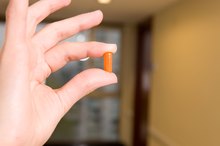What does fact checked mean?
At Healthfully, we strive to deliver objective content that is accurate and up-to-date. Our team periodically reviews articles in order to ensure content quality. The sources cited below consist of evidence from peer-reviewed journals, prominent medical organizations, academic associations, and government data.
- Office of Dietary Supplements; Dietary Supplement Fact Sheet: Vitamin B12; 2010
- British Journal of Clinical Pharmacology; Replacement therapy for vitamin B12 deficiency: comparison between the sublingual and oral route; Amir Sharabi; 2003
- British Journal of Clinical Pharmacology; Replacement therapy for vitamin B12 deficiency: comparison between the sublingual and oral route; Amir Sharabi; 2003
The information contained on this site is for informational purposes only, and should not be used as a substitute for the advice of a professional health care provider. Please check with the appropriate physician regarding health questions and concerns. Although we strive to deliver accurate and up-to-date information, no guarantee to that effect is made.
Vitamin B12-also known as cobalamin, is needed for the proper development and functioning of blood cells, nerve cells, skeletal and cardiac muscle cells; and the brain. B12 deficiency is treated by giving vitamin B12 as intramuscular injections, oral tablets, nasal gels, nasal spray, behind-the-ear patches or sublingual tablets and lozenges. Sublingual means below or beneath the tongue. Vitamin B12 administered sublingually is a safe and effective means to treat or prevent B12 deficiency. Consult your physician before taking sublingual or any other form of B12.
How B12 Normally Enters the Body
Most vitamin B12 is absorbed in the small intestine. Before this can happen, however, B12 must be liberated from food by stomach acid and combined with intrinsic factor, a protein produced and released by parietal cells in the stomach. Together, B12 and intrinsic factor are absorbed from the ileum into the blood stream. The amount of intrinsic factor limits the rate at which B12 can enter the blood stream. If the parietal cells are disabled or destroyed as in pernicious anemia, very little ingested B12 can reach the blood.
- Most vitamin B12 is absorbed in the small intestine.
- Together, B12 and intrinsic factor are absorbed from the ileum into the blood stream.
Sublingual B12 -- Treatment for Pernicious Anemia
B12: Patch Vs. Shots
Learn More
Historically, B12 deficiency has been treated with intramuscular injections of B12 instead of tablets. This seems logical, especially in the case of pernicious anemia. Why give oral B12 when very little of it will be absorbed? For many, B12 injections require monthly visits to the doctor for shots which are sometimes painful.
- Historically, B12 deficiency has been treated with intramuscular injections of B12 instead of tablets.
- For many, B12 injections require monthly visits to the doctor for shots which are sometimes painful.
How Sublingual Tablets Work
Sublingual B12 tablets are specially formulated tablets which are placed under the tongue and held there until they fully dissolve. As the tablet dissolves in the saliva, the mixture is absorbed through the tissues of the cheeks, palate and under the tongue. The B12 can enter the blood stream bypassing the stomach, intestines and liver.
Is Sub-lingual B12 better that Oral B12?
Sublingual Vitamin B12 vs. Injectable B12
Learn More
Oral B12 have been shown to be as affective as B12 injections. In 2006, Cardiff University researchers published a study in the "Oxford Journal" which found that sufficiently high doses of oral B12 was as effective as intramuscular injection in treating B12 deficiency.
Surprisingly, there is no significant difference in the effectiveness of sublingual B12 tablets versus oral B12 tablets. University of Tel Aviv researches published a 2003 study in the "British Journal of Clinical Pharmacology" looking at the effectiveness of sublingual B12 versus oral B12 in subjects with B12 deficiency 2. The subjects were randomly given 500 micrograms of B12 sublingually or orally, or two tablets daily of a vitamin B complex. The researchers found that both dosage forms effectively treated B12 deficiency.
A similar study published in "The Journal of Alternative and Complementary Medicine" in 2006 by University of Bridgeport College of Naturopathic Medicine researchers substantiated the Israeli study results 3.
- Oral B12 have been shown to be as affective as B12 injections.
- University of Tel Aviv researches published a 2003 study in the "British Journal of Clinical Pharmacology" looking at the effectiveness of sublingual B12 versus oral B12 in subjects with B12 deficiency 2.
Related Articles
References
- Office of Dietary Supplements; Dietary Supplement Fact Sheet: Vitamin B12; 2010
- British Journal of Clinical Pharmacology; Replacement therapy for vitamin B12 deficiency: comparison between the sublingual and oral route; Amir Sharabi; 2003
- Journal of Alternative and Complementary Medicine" A Single-Center, Double-Blinded, Randomized Controlled Study to Evaluate the Relative Efficacy of Sublingual and Oral Vitamin B-Complex Administration in Reducing Total Serum Homocysteine Levels ; Yuka Yazak; 2006 University of Bridgeport College of Naturopathic Medicine
Resources
Writer Bio
Allen Bethea has written articles on programming, web design,operating systems and computer hardware since 2002. He holds a Bachelor of Science from UNC-Chapel Hill and AAS degrees in office technology, mechanical engineering/drafting and internet technology. Allen has extensive experience with desktop and system software for both Windows and Linux operating systems.









